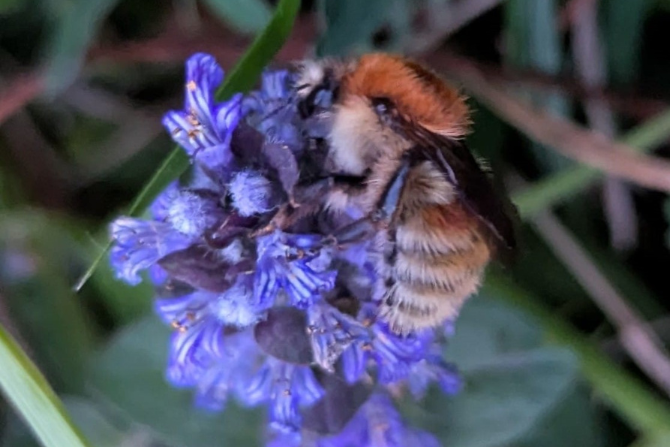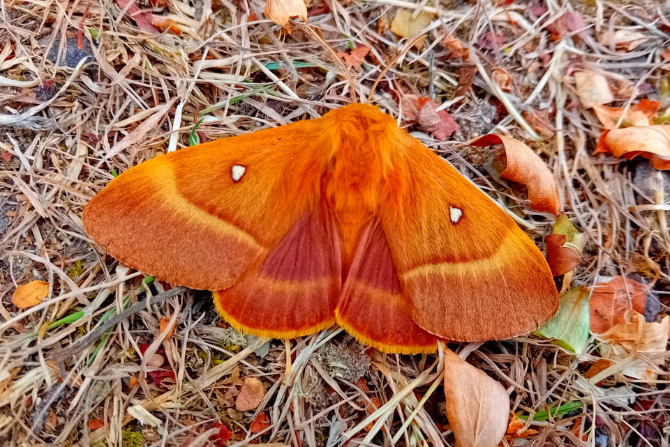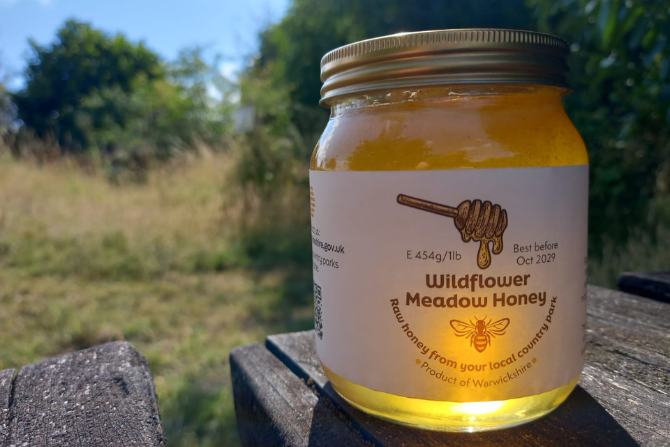
Milestone marked amidst numerous biodiversity initiatives, including a new meadow managed by resident Hebridean sheep.
Rangers at Ryton Pools Country Park have recently recorded the 3,000th species at the site – a fantastic milestone that showcases the park’s rich and growing biodiversity. The honour went to a tiny micro-moth, Narycia duplicella, discovered by Countryside Ranger George while out looking for Pine Ladybirds.

Female Oak Eggar Moth (Lasiocampa quercus)
This incredible figure reflects years of careful site management and recording work, a collaboration between the ranger team and local experts and volunteers. From beetles and bees to butterflies and birds, the site now supports regionally and nationally important species across a wide range of habitats. Highlights include all 14 species of bumblebee found in Warwickshire, rare spiders, and priority butterfly species like the Wood White and Dark Green Fritillary.
This biodiversity milestone follows the establishment of a second Biodiversity Net Gain (BNG) Offsetting meadow within the park. BNG is a national approach to conservation, aiming to ensure that development leads to measurable improvements for nature by funding habitat creation and restoration.
Following the success of the first BNG meadow established a few years ago, the project to create a second meadow began around 18 months ago with surveys and soil sampling. The 12-acre site was identified as having strong potential for biodiversity enhancement due to its nutrient-poor soil and low diversity of grassland species. A 30-year management plan has been developed to guide the work, backed by funding to support long-term care.
Now, on-the-ground work is underway. Unlike the existing BNG meadow, the new one is expected to be managed entirely by the park’s resident Hebridean sheep through rotational grazing – a low-impact, wildlife-friendly method of maintaining healthy grassland. The field has been fenced off and divided into sections so the sheep can be moved periodically to help encourage diverse plant growth and habitat structure.
In more good news for biodiversity, and just in time for Bee’s Needs Week, the diversity of wild bees recorded at Ryton Pools has soared to 114 species. Notable new additions include the nationally scarce Brown-Banded Carder Bumblebee, and Black-headed Mining Bee.

The rangers also tend their own beehives, home to honeybees that forage across the park’s wildflower meadows. This summer, the team were thrilled to harvest their first batch of Ryton Pools Wildflower Honey, now available for £6 a jar in the visitor centre.
Councillor Darren Cheshire, Portfolio Holder for Environment, Heritage and Culture at Warwickshire County Council, said:
"This incredible milestone at Ryton Pools is a great reminder of the role our Country Parks play in protecting nature and supporting biodiversity. It’s thanks to the hard work of our rangers, volunteers and partners that sites like this can thrive. Whether you're coming to spot butterflies or pick up a jar of local honey, there's never been a better time to visit."
To discover the park’s wildlife for yourself, and maybe take home a jar of honey, plan your visit to Ryton Pools Country Park.
For further updates from Warwickshire Country Parks, sign up to the monthly newsletter.